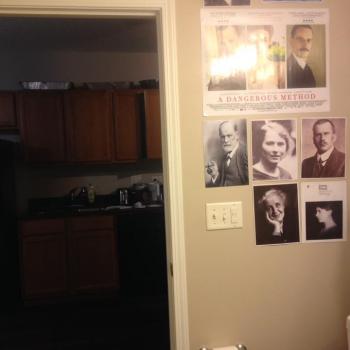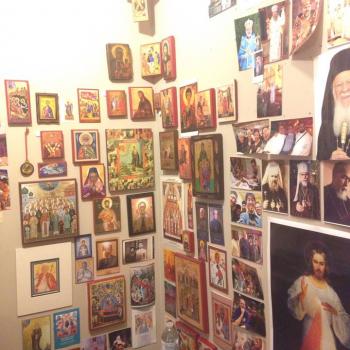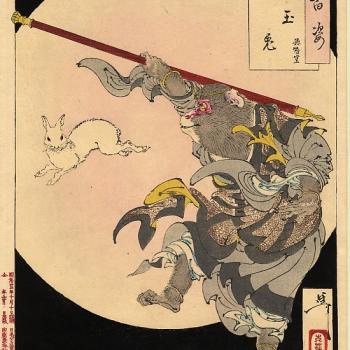![Kim Kardashian, Kanye West Have Baby Girl Before Fathers Day (CC BY-ND 2.0 [https://creativecommons.org/licenses/by-nd/2.0/]), via Flickr](https://wp-media.patheos.com/blogs/sites/721/2013/12/9056046476_86c5fab614_o.jpg)
And thus, having associated in my mind Duck Dynasty with Barbara Walters’s observation that Kimye consistently make the news for no good reason, I decided to write off the Duck Dynasty poobah as uninteresting.
I was wrong.
With some subtle nuances across the various people commenting on this incident, this phenomenon has turned into an opportunity to talk about freedom of speech as an American First Amendment right. For example, Sarah Palin has fired this shot across the bow.
Others have clarified that what they mean is that the free market of ideas has been censored. The Alliance Defending Freedom has decried the ‘one-sided censorship of the cultural and political elites enraged by such a basic teaching,’ calling for A&E; and other media outlets to maintain the ‘free marketplace of ideas’ while positioning itself as an organization that ‘exists to preserve and protect free speech and to stand against these types of meritless attacks upon freedom.’ Mollie Hemingway takes the ‘tolerance’ of ‘our country’ to task, accusing the nation of tolerating ‘twerking Mileys, gay Rudolphs pitching Obamacare, and polygamy’ while ‘not tolerating those whose sexual norms are based on the Bible.’ For Hemingway, religious freedom is under attack because those who placed Robertson under indefinite suspension fail to understand Robertson’s biblical world, which is premised on ‘the forgiveness of sins’ a the basis for the quote from 1 Corinthians 6. The Family Research Council’s Tony Perkins appeared on Fox’s Kelly Report to accuse the Gay and Lesbian Alliance Against Defamation (GLAAD) of going after Robertson as the ‘biggest guy’ among social conservatives as they allegedly follow in a pattern of ‘demonizing and marginalizing people who hold traditional moral views.’ Perkins called for an alternative: to respect Duck Dynasty as ‘reality TV’ in which the Robertson family is portrayed as ‘real,’ complete with the freedom to express ‘a set of values that is grounded in scripture which many people across this country still subscribe to.’ As it is, the Ethics and Religious Liberty Commission’s Russell Moore argued that what has happened is the ‘censorship’ of biblical values that operates in the same way that rock and roll was censored in the 1960s. What is needed instead is a free market: ‘Let’s have genuine diversity, meaning let’s talk honestly with one another about what we believe and why. Muting one another isn’t what debate is for in a free society. It’s what remote controls are for.’
However, others have been more careful about the free speech allegations. While instructing Robertson to tell A&E; to ‘go to hell’ for its double standard, The American Conservative’s Rod Dreher neatly sidestepped the free speech allegations by saying that he has ‘no problem with A&E; distancing themselves from Robertson, and criticizing him.’ Instead of dealing with this case as one of free speech, Dreher is unearthing the contradictions of a private company, which has led First Things‘s Ron Belgau to observe that Christian institutions are just as self-censoring as A&E;. Likewise, Al Mohler tells Christians on the right to beware of the lure to ‘publicity,’ invoking General Stanley McChrystal’s interview in Rolling Stone as an example of why conservatives should be wary of giving interviews to outlets of the ‘cultural left.’ In other words, Mohler is saying that this marketplace of ideas is not only free; it can be freely brutal in its competition. Accordingly, Megyn Kelly conducted an interview that significantly contrasted her earlier comments about the whiteness of Jesus and Santa. On the Duck Dynasty issue, Kelly played the role of neutral, undecided citizen, concluding, ‘Boy, we are a long way from resolving this,’ that is to say, the competition of market forces has not yet made a conclusion. Strangely enough, these people implicitly agree with GLAAD spokesperson Jeremy Hooper when he told Megyn Kelly, ‘This is not a free speech issue. Defenders of Phil Robertson are seeking freedom from consequence. None of us are entitled to that.’ In other words, the jury of the market is still out.
Such care to keep the market as the market is significant. After all, if Phil Robertson’s free speech has indeed been regulated, policed, censored, and thus violated by A&E;, then A&E; is standing in as a substitute for the state. As Hannah Arendt reminded us long ago in The Origins of Totalitarianism, rights have been conventionally protected by the state. As it happens, the right to free speech is a constitutional First Amendment right with reference to the state: ‘Congress shall make no law respecting an establishment of religion, or prohibiting the free exercise thereof; or abridging the freedom of speech, or of the press; or the right of the people peaceably to assemble, and to petition the government for a redress of grievances’ (emphasis mine). That is to say, the allegation that A&E; has stripped Phil Robertson of his right to free speech neatly conflates Congress with a private corporation. If that is indeed so, it would be an earth-shattering concession from the Right to #OccupyWallStreet, Smiley and West, Elizabeth Warren, and everyone else decrying neoliberal governance in which private corporations have definitively co-opted the American government.
This is where Robertson’s comments about African Americans come into play. While many have complained that the attention has revolved more around Robertson’s homophobia than his denial that the African Americans around him were singing the blues (see the comments of Ben Ferguson, Marc Lamont Hill, and Michael Brown on the Piers Morgan Show, for example), Robertson’s comments on race in the GQ profile are in fact a critique of the welfare state:
I never, with my eyes, saw the mistreatment of any black person. Not once. Where we lived was all farmers. The blacks worked for the farmers. I hoed cotton with them. I’m with the blacks, because we’re white trash. We’re going across the field…. They’re singing and happy. I never heard one of them, one black person, say, ‘I tell you what: These doggone white people’—not a word!… Pre-entitlement, pre-welfare, you say: Were they happy? They were godly; they were happy; no one was singing the blues. (emphasis mine)
In other words, Robertson attributes the invention of race and civil rights to the rise of the welfare state. For Robertson, the welfare state has in fact created inequality between African Americans and ‘white trash.’ In Robertson’s lived experience, they used to be equals, ‘godly,’ ‘happy.’ After the welfare state allegedly elevated them with ‘entitlement’ and ‘welfare,’ Robertson now perceives them as playing the victim card by ‘singing the blues,’ paradoxically elevated above ‘white trash’ by the state. If there’s anyone marginalizing his voice, then, he thinks it’s the welfare state.
In short, Robertson’s comments are ideologically libertarian, playing into the ideological work of the Right. By blaming the state for racial inequality, Robertson suggests that the welfare state must be dismantled. Government is too big, he thinks. He laments that the private sphere is hurting.
But with the introduction of the freedom of speech and censorship material, Robertson’s welfare state becomes merged with private corporations as the ‘cultural and political elites’ whose tolerance is intolerant of Robertson’s reading of Scripture. I recognize, of course, that the material about elites has resonances with sociologist James Davison Hunter’s analysis in Culture Wars and To Change the World of how ‘elites’ on both the right and the left have been contesting each other for control over America’s ‘cultural production’ in the latter half of the twentieth century. But what is interesting is that in this Duck Dynasty fiasco, the welfare state and the corporate media elite have been merged into one single elite apparatus that stands in the place of Congress making a law that violates its neutrality in not ‘respecting an establishment of religion, or prohibiting the free exercise thereof’ while ‘abridging the freedom of speech, or of the press.’
In short, even if these critiques were to call for the elevation of the private sphere and the dismantling of an activist welfare state (just as Robertson is doing in his comments on race), the freedom of speech would still be abridged. Yes, this is a critique of big government, but it’s not a government that is big and bloated because the state apparatus is inordinately large. It’s because the private sphere and the state are irreducibly one.
And thus, we return to Kim Kardashian and Kanye West. At the Harvard Graduate School of Design, West declared, ‘I really do believe the world can be saved through design and everything actually needs to be architected,’ before lamenting that ‘there’s traditionalists that hold back the good thoughts and there’s people in offices that stop the creative people, and are intimidated by actual good ideas’ that could result in the realization of ‘utopia.’ Kanye West is saying the same thing as those denouncing A&E; for censoring the marketplace of ideas. There is a neoliberal paradise that they all imagine together, one in which private institutions design social structures that can lead away from the imposing interventions of the welfare state. And yet, those very same private institutions hold the world back from utopia by suppressing free creative expression because they are self-interested. This is an unintentional concession that the internal contradictions of the private consensus may render its promises of paradise practically non-viable.
I suspect it’s because of that that the private consensus is unraveling.
POSTSCRIPT: For those who want to have an excuse to track Kimye more closely, I encourage all of my readers to follow @KimKierkegaard and @KanyeHauerwest on Twitter.
UPDATE: For the sake of shorthand, we will be referring to today’s post in forthcoming entries as the Kimye hermeneutic. Be forewarned.















